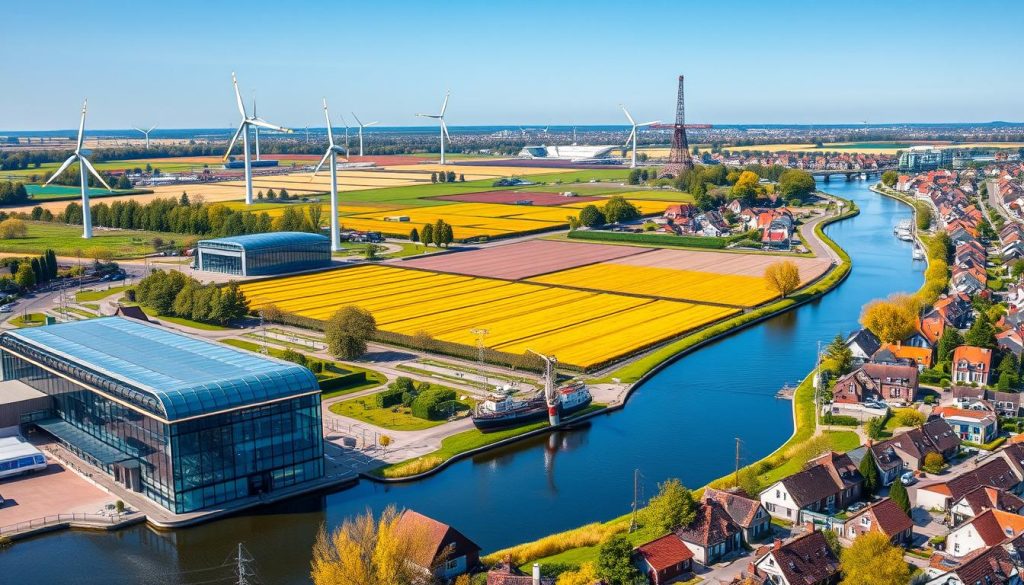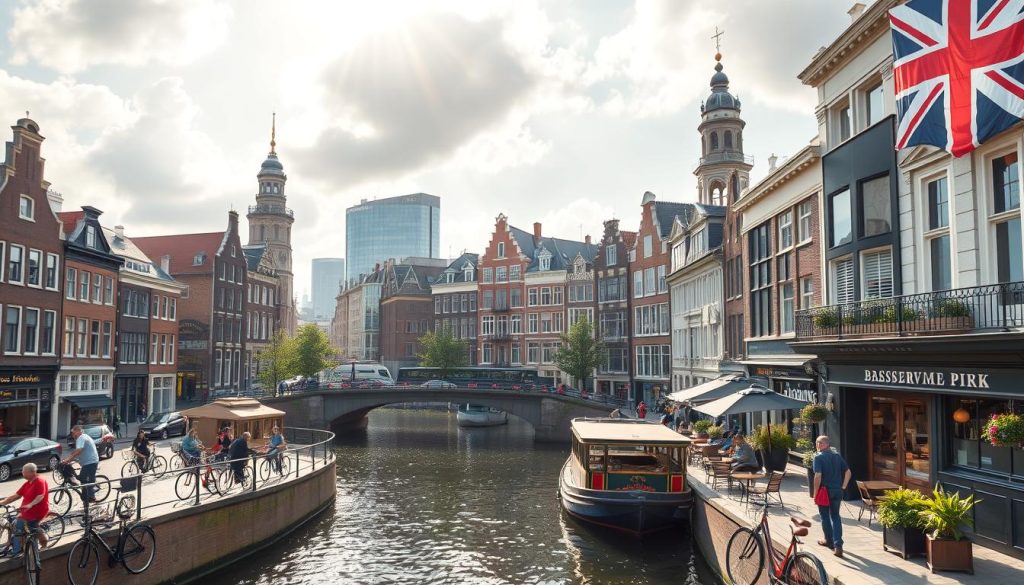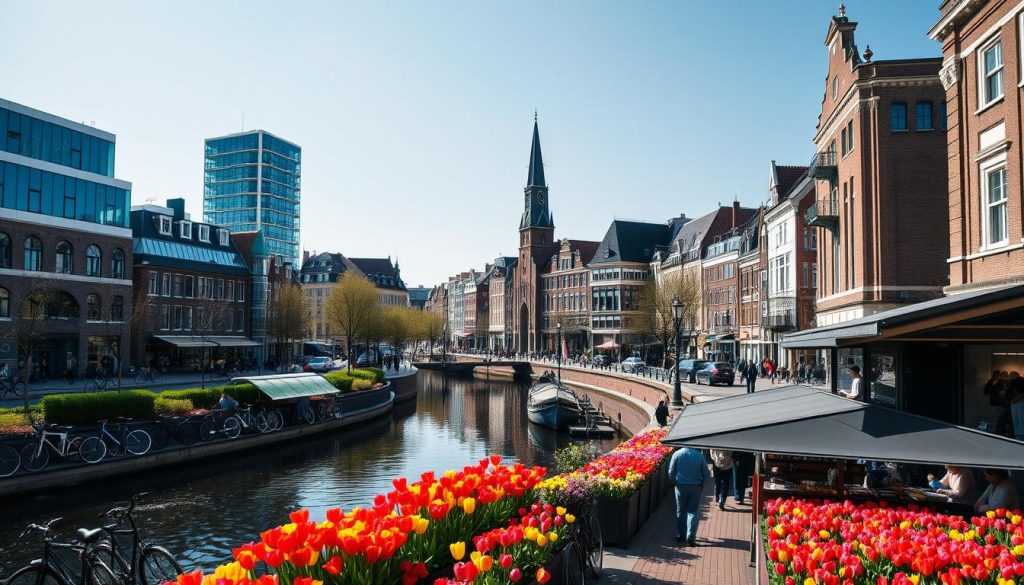The Netherlands is a key entry point to Europe, offering many chances for UK Entrepreneurs. It’s known for its innovative vibe, great location, and solid infrastructure. This makes it perfect for businesses looking to grow globally.
This guide will cover the key points of doing business in the Netherlands. It will show the benefits of its business-friendly laws and the thriving market. With good tax rules and a welcoming stance on foreign investment, the Netherlands is a great choice for growth in Europe.
Introduction to the Dutch Business Environment

The Dutch business scene is open and supports international trade and investment well. This is key to the Dutch economy’s growth. It often ranks high in ease of doing business.
The Netherlands has a good set of rules that help start-ups and new ideas. This makes it easy for businesses to grow.
Important sectors like tech, logistics, and farming boost the economy. These areas offer great chances for businesses to grow. The focus on being green also helps new eco-friendly technologies to flourish.
In short, knowing the Dutch economy helps entrepreneurs. It prepares them to succeed in this lively business world.
Understanding Dutch Business Culture

Getting to know Dutch Business Culture is key to making strong professional connections. In the Netherlands, networking is vital for success. It’s all about building trust and lasting partnerships.
The Importance of Networking
Networking in the Netherlands goes beyond just formal events. People often meet at informal gatherings to make valuable connections. These events show how important it is to build relationships, not just make deals.
It’s best to approach networking with a genuine interest in others’ businesses. This can really help in working together effectively.
Dutch Work Ethic and Values
The Dutch Work Ethic is built on honesty, reliability, and fairness. Being on time shows respect for others’ time. They value direct communication, making sure everyone knows what’s expected.
These values help teams work well together. They make business dealings successful in many areas.
Legal Framework for Business Operations

The legal setup for businesses in the Netherlands is strong and fair. It’s based on the Dutch Civil Code, which covers important business rules. These rules help with setting up companies, labour laws, taxes, and environmental issues.
When starting a business in the Netherlands, knowing your options is key. You can choose from sole proprietorships, partnerships, or limited liability companies. Each has its own rules and benefits. It’s important to pick the right one for your business goals and to follow Dutch laws.
Also, working with the Netherlands Chamber of Commerce is crucial. They help with registering your business and offer guidance through the legal process. Knowing these rules helps create a solid and legal business base.
Key Industries in the Netherlands

The Netherlands has many key industries that shape its economy. These sectors are important for UK businesses looking to enter this market. The tech sector is growing fast, thanks to innovation in cities like Amsterdam.
The country is also known for its agriculture and horticulture. It uses advanced methods that are both productive and sustainable.
Technology and Innovation
The tech sector in the Netherlands focuses a lot on research and development. Companies here are making big strides in:
- Information and communication technology
- Artificial intelligence
- Cybersecurity advancements
This innovative scene attracts top talent and supports startups. UK businesses can benefit from working together and sharing knowledge.
Agriculture and Horticulture
The Netherlands leads the world in agricultural innovation. It uses advanced methods to be sustainable and efficient. This makes it a big player in exporting agricultural products.
- Precision agriculture technology
- Greenhouse horticulture practices
- Optimal supply chain solutions
The tech and agriculture sectors work well together. This offers great chances for UK entrepreneurs to invest in sustainable farming. This approach boosts productivity and helps the environment.
Setting Up Your Business in the Netherlands

Starting a business in the Netherlands means taking important steps. First, you need to pick the right business structure. Knowing your options is key because it affects your personal risk, taxes, and how you run your business. Let’s look at the different structures you can choose from.
Choosing the Right Business Structure
When you’re thinking about starting a business in the Netherlands, you have a few popular choices:
- Private Limited Company (BV) – Great for small to medium businesses. It protects your personal assets and lets you decide who owns the company.
- Public Limited Company (NV) – Best for bigger businesses. It lets you sell shares to the public, which can bring in more money but means more rules to follow.
- Sole Proprietorship – Good for freelancers or small businesses. But, it means you don’t have personal liability protection.
Each structure has its own rules about taxes and how you make decisions. It’s important to know what you’re getting into before you start. After choosing your structure, you’ll need to register your business in the Netherlands.
Registration Process
The registration process in the Netherlands includes a few key steps:
- Get all the documents you need, like a business plan and ID.
- Send in your registration forms to the Netherlands Chamber of Commerce.
- Get a VAT number, which you’ll need for taxes.
- Make sure you follow all local laws and rules for your industry.
Getting your registration right is crucial for your business. Understanding the structure and registration rules helps you stay on the right track. It also helps your business grow in the future.
Taxation in the Netherlands

The Netherlands has a strong tax system that helps businesses grow while following the rules. It’s key for entrepreneurs to know about Corporate Tax and VAT Regulations. This knowledge is vital for those starting or growing their businesses here.
Corporate Tax Overview
The corporate tax rate in the Netherlands is 25%. This makes it a good place for businesses to thrive. Small companies get a lower rate on their profits, which helps new businesses start.
This clear tax system makes it easier for companies to follow the rules. It helps them understand their tax duties well.
Value Added Tax (VAT) Regulations
VAT, or Value Added Tax, is important in the Netherlands. The standard VAT rate is 21%, covering most goods and services. But, there are lower rates for things like food and medicine.
Businesses need to know about VAT to stay in line with tax rules. It’s important for them to handle tax on sales correctly.
Hiring Employees in the Netherlands

When you think about hiring in the Netherlands, it’s key to know the labour laws. These laws protect workers’ rights and ensure they’re treated fairly. Knowing these laws well can make hiring smoother and create a better work place.
Understanding Labour Laws
Labour laws in the Netherlands set rules for employers and workers. They cover many areas, such as:
- Employment contracts that outline terms and conditions of employment.
- Regulations concerning salaries, ensuring they meet the statutory minimum.
- Working hours and conditions, including vacation and sick leave policies.
- Health insurance and pension requirements that employers must provide.
It’s important to know the rules about contracts and keeping a fair work place. Breaking these laws can lead to big fines.
Employee Benefits and Rights
Employee rights in the Netherlands are strong and protect workers. Employers must give many benefits to help their employees. Some of these include:
- Mandatory health insurance coverage.
- Pension plans that employees can rely upon for their future.
- Support for work-life balance, including flexibility in working hours.
- Training opportunities for professional development.
Also, if you’re hiring people from abroad, you need to know about immigration laws and work permits. Getting this right helps international workers fit well into the Dutch work force.
Doing Business in Netherlands: Essential Compliance

Ensuring Business Compliance Netherlands is key for companies wanting to set up in the Netherlands. Knowing the Regulatory Requirements well is vital to steer clear of problems.
Key areas of compliance include:
- Environmental Regulations: Businesses must follow strict rules to cut down environmental harm and support sustainability.
- Health and Safety Standards: Employers must ensure a safe workplace. Following local health laws is a must.
- Financial Reporting Requirements: Accurate and on-time financial reports are crucial. Companies must stick to Dutch accounting rules and deadlines.
- Data Protection Laws: Under the General Data Protection Regulation (GDPR), businesses must protect personal data of employees and customers.
Not following these rules can lead to big fines and legal trouble. This shows how important it is to keep up with all laws and rules. Companies might want to get help from local legal experts to deal with these complex rules.
Funding and Investment Opportunities

The Netherlands is a great place for funding and investment. It offers many chances for entrepreneurs and startups. The government helps by providing grants and supporting venture capital. This helps businesses grow and innovate.
Government Grants and Subsidies
In the Netherlands, government support is key for starting a business. They offer grants and subsidies for new projects, especially in tech, green energy, and healthcare. These help reduce financial risks and encourage growth.
- Financial support for research and development activities.
- Tax incentives to facilitate business expansion.
- Access to networks that can aid in application processes.
Venture Capital Landscape
The venture capital scene in the Netherlands is strong and wide. It gives vital money to promising startups. Tech and green businesses are especially sought after. This is thanks to:
- A growing pool of experienced investors.
- Strong governmental support for innovative businesses.
- A collaborative ecosystem that encourages knowledge sharing.
Business Etiquette and Communication

Understanding Business Etiquette in the Netherlands is key. The Dutch Communication Style is all about being direct and clear. This style helps everyone feel free to share their thoughts. But, UK entrepreneurs might find it too straightforward at first.
Negotiation Styles in the Netherlands
Good negotiation in the Netherlands means being well-prepared, patient, and focused on finding common ground. Here are some important points to remember:
- Having discussions beforehand and making decisions together is crucial.
- Valuing each other’s opinions helps create a good atmosphere.
- Being flexible can help find better solutions.
- Building strong relationships takes time but is essential for success.
Grasping these points will help UK businesses do well in negotiations. It will also help them fit in with the Dutch way of doing things.
Challenges Faced by UK Entrepreneurs

UK entrepreneurs face unique challenges when entering the Dutch market. These often come from cultural misunderstandings. It’s key to understand the differences in business practices and communication styles.
A lack of cultural understanding can cause misinterpretations. This can make business interactions difficult. The market competition in the Netherlands is also fierce, especially in tech and agriculture. A detailed market analysis is crucial for UK entrepreneurs to succeed.
Cultural Misunderstandings
Dutch culture can be a big challenge for UK entrepreneurs. The directness and communication styles can lead to misunderstandings. It’s important for entrepreneurs to spend time learning about cultural norms.
Key areas to focus on include:
- Direct communication, which may seem blunt to others.
- Emphasis on equality, affecting decision-making.
- Building professional relationships through networking takes time.
Market Competition Analysis
For UK entrepreneurs, a thorough market analysis is essential. The Netherlands’ competition, especially in tech and agriculture, is tough. A good analysis should cover:
- Identifying competitors and their strategies.
- Understanding local consumer demand and preferences.
- Knowing the regulatory environments and compliance rules.
Benefits of Expanding to the Dutch Market

UK entrepreneurs can find many opportunities in the Dutch market. The Netherlands is a key spot for reaching more European markets. It offers great chances for growth and new customers.
Business conditions in the Netherlands are good. Many are eager to see what benefits this lively market can bring.
Access to European Markets
Setting up in the Netherlands gives easy access to Europe. Companies can reach out to many consumers and businesses across the continent. This opens up:
- More chances to show products to different countries
- Easier ways to move goods around
- Opportunities to work with European companies
The Netherlands has a well-connected transport system. This helps businesses manage their supply chains well. It also meets the varied needs of European clients.
Strong Economic Indicators
The Netherlands has strong economic signs. These include:
- Regular GDP growth
- Low jobless rates
- Stable prices
These signs show a good place for new businesses to grow. Entrepreneurs looking at the Dutch market can be sure of a strong economy. It offers a lot of chances for success.
Logistics and Infrastructure

The logistics and infrastructure in the Netherlands are key for businesses. The country has advanced systems, including extensive transport networks and digital connections. These help in smooth distribution and communication, keeping industries efficient.
Transportation Networks
The Netherlands has a well-built transport system. It includes roads, railways, and waterways. This network helps:
- Move goods quickly across the country
- Get to major European markets fast
- Support green transport options
With big ports like Rotterdam, businesses get great logistics. This boosts their supply chain.
Digital Infrastructure
The Netherlands also shines in digital connectivity. It has invested in digital infrastructure, including:
- Fast internet everywhere
- Advanced data centres for cloud services
- Technology for e-commerce growth
This strong digital setup helps companies work well in the digital world. It encourages innovation and teamwork.
Case Studies: Successful UK Businesses in the Netherlands

The Netherlands is now a key spot for international business, drawing many UK companies. These firms have grown and thrived by using smart strategies. They’ve learned to fit in with the local culture, rules, and what people like to buy.
This knowledge is great for anyone thinking of starting a business. It shows how important it is to understand and adapt to the local scene.
- A global marketing agency successfully expanded its operations by using the Netherlands as a key spot for reaching the EU. They built strong local connections, which helped them get to important clients and networks.
- A popular food brand navigated local tastes to launch in the Dutch market. They did deep market research and talked to local people. This helped them make products that Dutch people loved, leading to a big success.
- A tech startup achieved remarkable growth by using methods that Dutch companies loved. They focused on working together and making products that people wanted. This helped them make a big splash quickly.
These stories from the Netherlands show how UK companies can adapt and succeed. It’s all about understanding the local market and culture. This is key to doing well in the Netherlands.
Resources for Entrepreneurs

The Netherlands is a great place for entrepreneurs, with lots of resources to help businesses grow. Government Agencies offer guidance on funding, rules, and how to enter the market. These resources are designed to help entrepreneurs succeed.
Government Support and Agencies
There are many government support programmes for entrepreneurs in the Dutch market. Key resources include:
- Information centres focused on providing insights into funding opportunities.
- Workshops and networking events coordinated by public institutions.
- Advisory services offering tailored assistance in business development.
- Access to databases containing valuable industry reports and market analyses.
Using these Business Resources well is key for UK entrepreneurs in the Netherlands. Government Agencies provide the tools needed for success. This helps entrepreneurs prepare better and achieve more in a competitive market.
Future Trends in Dutch Business Landscape
The Dutch business scene is changing fast. Sustainability is becoming a big deal, with both people and companies going green. This move is good for the planet and makes Dutch businesses leaders in eco-friendly innovation.
UK entrepreneurs looking to invest here will see a rise in demand for green products. This shift in consumer tastes is a big opportunity.
Digital transformation is also key, changing how businesses work and talk to customers. New tech like AI, big data, and automation is making things more efficient. For those investing, keeping up with these trends is essential to stay ahead.
The Dutch market is also open to new ideas, perfect for start-ups and big companies. There’s a strong push for working together, with businesses, research groups, and the government. This teamwork is set to drive growth.
For UK entrepreneurs, understanding these trends and adapting is vital. It helps them stay competitive in this lively and changing market.

